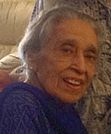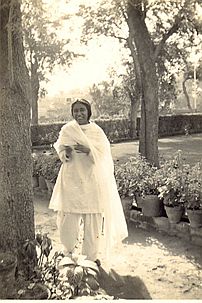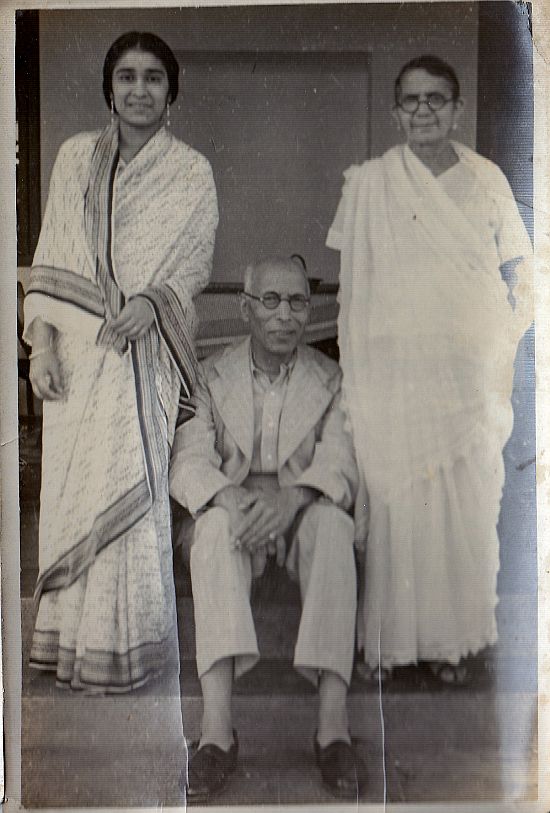Memories of youthful days in pre-Independence Punjab
Category:

Indira Pasricha was born on 17 January 1917 in Sidhpur in Multan district. She studied in Kinnaird College, Lahore. She married Prem Pasricha on 28 April 1940 in Lahore. She was a social worker and played an active role in saving Sikhs during the riots in 1984 in New Delhi. She was an active member of the women’s wing of the Bharatiya Janata Party. She and her husband Prem Pasricha helped the tribals in Orissa in setting up the Ekal Vidyalaya and eye camps.
Neera Burra, a sociologist, has a Ph.D. from the Delhi School of Economics. As Assistant Resident Representative at the U.N. Development Programme, India for several years, her focus was issues related to gender, poverty and environment. She has published extensively on the issue of child labour in India, including Born to Work: Child Labour in India Oxford University Press in 1997. Her most recent book is A Memoir of pre-Partition Punjab. Ruchi Ram Sahni 1863-1948 Oxford University Press 2017. A great granddaughter of Ruchi Ram Sahni, she maintains a blog about him https://ruchiramsahni.wordpress.com/.
Editor's note: Indira Pasricha dictated this story just five days before her death in May 2017 to her niece, Neera Burra. Indira was 100 years old when she passed away.

Indira Pasricha in Lahore in early 1940s
I was born on 17th January 1917 in Sidhpur in Multan district. My elder brother Indarjit was born on 10th November 1915 and Jagjit, my younger brother was born in 1920. My sister Vimal - whom we called Kaki - was born in 1923 in Rattigan Road.
Uncle Birbal, my father's younger brother, was very fond of me and my brother Indarjit. The family felt that Indarjit needed to get a good English education so his schooling was done at La Martinere in Lucknow. Indarjit remained with them till he finished his schooling. He used to come home during holidays.
Now, as I was left with only younger siblings, I stopped going to Bradlaugh Hall, where my grandparents (Ram Ruchi Sahni and Ishwari Devi) lived. I used to go there with Indarjit.
I also joined Sacred Heart Convent. I used to go in a school bus. Later when my younger brother, Jagjit, sister Kaki and cousins- Usha, Suvira and Kailash went to school, we went in a tonga.
When I was in Third Standard, a sister of uncle Birbal's wife Savitri was kidnapped from home, and converted to Christianity by the School. She became a nun. So we were all taken out from the Convent School.
There was no school for girls. Sir Ganga Ram built a school and handed it over to the Governor Maclagan and the school was called Lady MacLagan School. Here Muslim girls were given preference. Sir Ganga Ram got very upset, saying "Hamari Hindu ladkiyan kahan jayengi?" (Where will our Hindu girls study"). Then he bought a big house on Ferozpur Road and called it Sir Ganga Ram Hindu Girls High School. At the same time, he started building a school on Jail Road where the school shifted later.
After school, I went to Kinnaird College for Women in Lahore. Lakhvanti buaji (father's sister) was the first woman in our family to study in Kinnaird College. Leela buaji was the first woman graduate of Punjab University. My sister Kaki was also there along with my cousins Usha and Suvira.
Usha and Suvira were both very active in the students' movement at the time. Suvira was a card holding communist. Once the Principal of Kinnaird College called me to her office. She told me to warn my sister and my cousins not to get involved in politics\; otherwise they would get into serious trouble with college authorities.
Suvira and Usha would not listen to anything I said. There was so much josh (enthusiasm) that I would also go with them in the procession. They used to sing:
Mazromo ne mulon mulkon
(Ed.: Perhaps the above Punjabi words are wrongly transcribed. Perhaps the original words translate as "The workers of the country have united")
Jhanda lal uthaiya hai Have raised the red flag
Jo bhukha tha jo nanga tha The one who was hungry and naked
Ab gussa usko aya hai Now he has become angry
Sara sansar hamara hai The whole world is ours
Sara sansar hamara hai The whole world is ours
I was very close to Beji, which is what we called our grandmother. Sometimes, when she was cooking, I would go to the kitchen, and she taught me some dishes. I remember that she used to make a delicious roti with ghee and ajwain which was very crisp. I liked it a lot.
Political activities that I saw as a child
My grandfather's home was next to Bradlaugh Hall. It was famous because it was the headquarters of the Indian National Congress. Charles Bradlaugh really felt for the Indians and loved them. So he made this hall so that they could organize all activities from this place, including political meetings and social functions.
Many leaders used to come to our house when the Congress session was on. I remember the Congress session there. Because it was so close to my grandfather's house, Pt. Moti Lal Nehru came and stayed with us. My grandmother was very anxious about his stay - what food would she serve him. Luckily, we found a cook, who had worked for Pt. Nehru, which made it easy.
So at that time many important people visited our house, and had their tea sessions. Once they asked for shakkar, and my grandmother replied, "We don't have any.'' She didn't realize that they were asking for sugar, which she had because she did not know that shakkar mean sugar.
Once I was going to Bradlaugh Hall, I found something shining, which curiously picked up, and took home. It was all covered by mud. I was washing it under a tap, thinking that it was a toy. When my uncle saw it, he shouted at me and asked me "Do you know what it is? Go and leave it where you got it." I felt scared and left it where I found it. Later, my uncle told me that it was a pistol, and it could have been fully loaded. I was very frightened and all my life I have been feeling guilty that I did not do the right thing.
I remember the time when Bhagat Singh, Rajguru and Sukhdev were hanged. The Britishers were so frightened that they even did not handover the dead bodies to their relatives. Instead, they took them to Ferozpur, where their bodies were cut into pieces and burnt "unke bodies bhi nahi diye they, tukre tukre karke kiya tha." Bhagat Singh's sister showed me a small box. She said, "Dabbi me the adhe jale huwe tukre (there were half-burnt pieces in a small box)" She said, "'Ye diya hai unhone, (this is what the British gave."
On the day that Bhagat Singh, Rajguru and Sukhdev were executed, no food was cooked in anybody's house in Lahore - as a sign of mourning.
Jatindra Nath Das, another revolutionary, was in jail in Lahore. The food was so bad that he fasted for over 65 days. He died there in 1929. His body was taken in a procession through the Anarkali bazaar. We all participated in the procession. His body was later taken to Calcutta.
In those days, my mother used to take me to all political meetings. Those days no khadi sarees were available. My mother and aunts and most ladies used to dye and block print khadi sarees, which they wore for political meetings. This was also the time when there was a boycott of all things foreign. Everyone brought their western clothing and threw in the bonfire in front of Bradlaugh Hall. I also took my lacy frocks and threw them into the fire.
When the Simon commission came to Lahore (in 1928), there was a lot of agitation. People were shouting "Simon go back". Some people also flew kites marked 'Simon Go Back'. Next day, when we felt excited and made an effigy of Simon with shoes on his head, Bhagat Singh's younger brother joined us. We thereafter ‘burnt it' the effigy. Simon Commission reports were put on a donkey and paraded, and then burnt.
One day, CID people came and conducted raids in Lalaji's (as we called my grandfather) house and even locked the kitchen, because our grandfather was engaged in political activities. My uncle Manohar had a text book, which, he took out and hid in the straw meant for cows. They found nothing.
There were some rooms next to Bradlaugh Hall where revolutionaries used to stay. We children used to sing wicked songs and tease the three or four CID people stationed outside Bradlaugh Hall. Many years later, Uncle Kohli who was travelling by train was told by some police officers "Aapke bacche hame bahut sharminda karte thhe (Children of your family used to embarrass us)."
Those days we improvised and copied the elders whether it was burning the effigy of Simon or making salt in small salt pans. When Gandhiji launched the Salt Satyagraha movement, my grandfather took the children to river Ravi. There were salt pans. Next day we collected some salt, mixed it with water, and made very small salt pans. Next day, the salt came up, from which we made small salt bags and sold them.
We even made a doll with long hair for a mundan ceremony.
After Lalaji retired from government service in 1918 he became very involved with political activities. He often took my father to meetings of the Congress party. They went together to the Congress sessions in Calcutta and Nagpur. My father would also attend political meetings at Bradlaugh Hall. My brother Indarjit and I were also attracted to the political meetings at Bradlaugh Hal.
I still remember the songs that the Seva Dal members sang:
Ab to Gandhi ke Charkhey chalaye jayengey Now Gandhi's spinning wheel will be used
In Charkhon se mudey banaye jayengey With this spinning wheels we will make yarn
In Muddon se golay bannaye jayengey From this yarn we will make balls
In golay se gorey uraye jayengey With these balls the white man will be demolished
Another song I remember from my childhood about banning liquor is: (Ed.: Can anyone translate this? If you can, please contact at indiaofthepast@gmail.com. Perhaps some of the Punjabi words are wrongly transcribed.)
bhan botal tord pyaley noon,
Sau chittar vechan vaaley noon,
Laknanat peeney vaaley noon,
bhan botal tord pyaley noon

Indira Pasricha, left, with her in-laws in Lahore in the early 1940s
_______________________________________
© Neera Burra 2017
Editor's note: I approve all comments written by people, provided the comments are related to the story. The purpose of approval is to prevent unwanted commetns, inserted by bots, which are really adverstiments for their products.
Comments
I have come back to this site
Add new comment